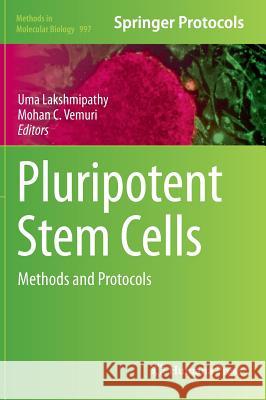Pluripotent Stem Cells: Methods and Protocols » książka
Pluripotent Stem Cells: Methods and Protocols
ISBN-13: 9781627033473 / Angielski / Twarda / 2013 / 292 str.
Human pluripotent stem cells such as human embryonic stem cells (hESC) and induced pluripotent stem cells (iPSC) with their unique developmental plasticity hold immense potential as cellular models for drug discovery and in regenerative medicine as a source for cell replacement. While hESC are derived from a developing embryo, iPSC are generated with forced expression of key transcription factors to convert adult somatic cells to ESC-like cells, a process termed reprogramming. Using iPSC overcomes ethical issues concerning the use of developing embryos and it can be generated from patient-specific or disease-specific cells for downstream applications. Pluripotent Stem Cells: Methods and Protocols highlights the best methods and systems for the entire work flow. Divided into four convenient sections, topics include a focus on producing iPSC from diverse somatic sources, media systems for expanding ESC and iPSC with detailed protocols for directed differentiation into specific lineages, commonly used cellular and molecular characterization methods, and the potential application of labeled stem cells with specific methods for cloning, gene delivery and cell engineering. Written in the successful Methods in Molecular Biology(TM) series format, chapters include introductions to their respective topics, lists of the necessary materials and reagents, step-by-step, readily reproducible protocols, and notes on troubleshooting and avoiding known pitfalls. Authoritative and easily accessible, Pluripotent Stem Cells: Methods and Protocols seeks to serve both professionals and novices with its well-honed methodologies in an effort to further our knowledge of this essential cellular feature.











